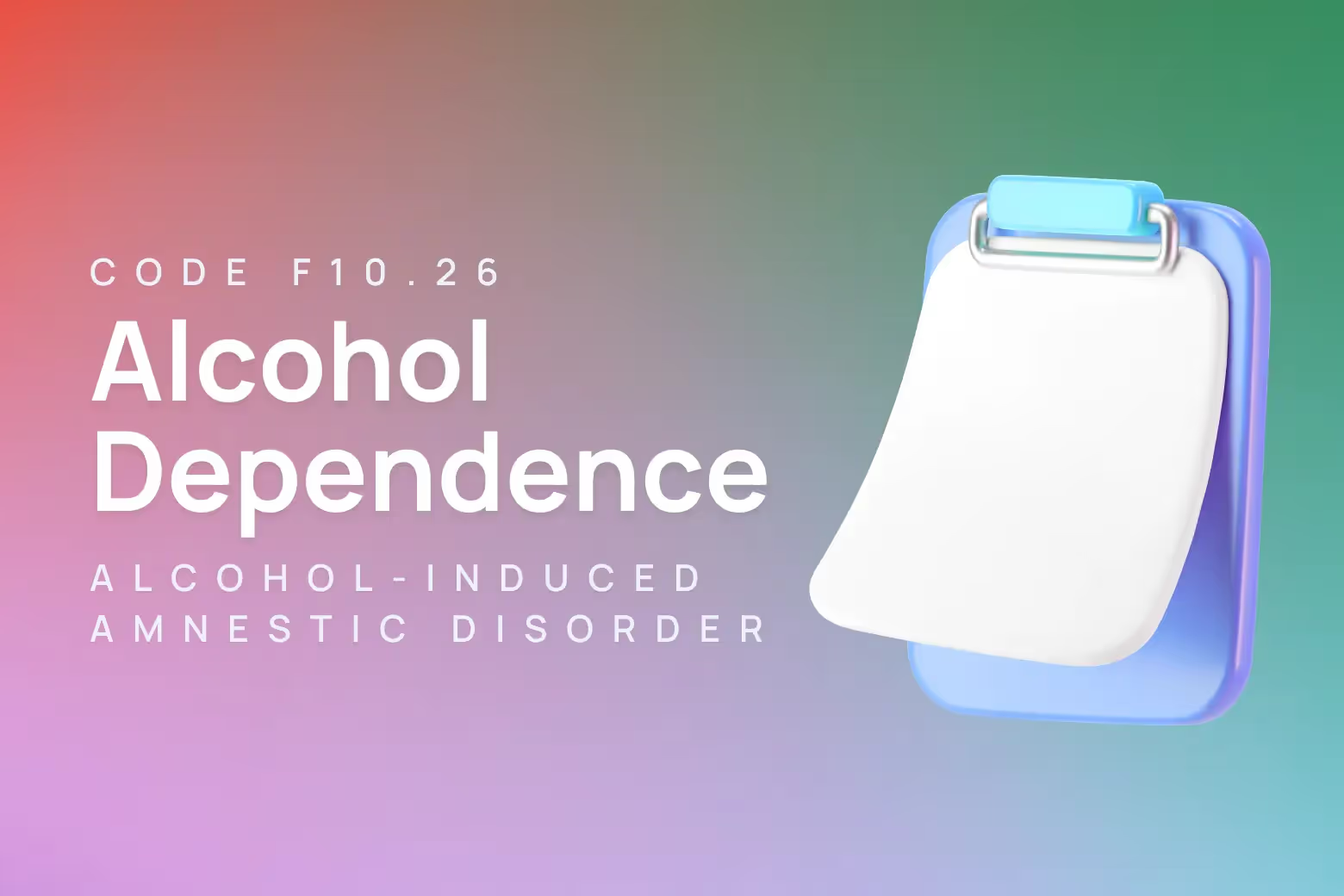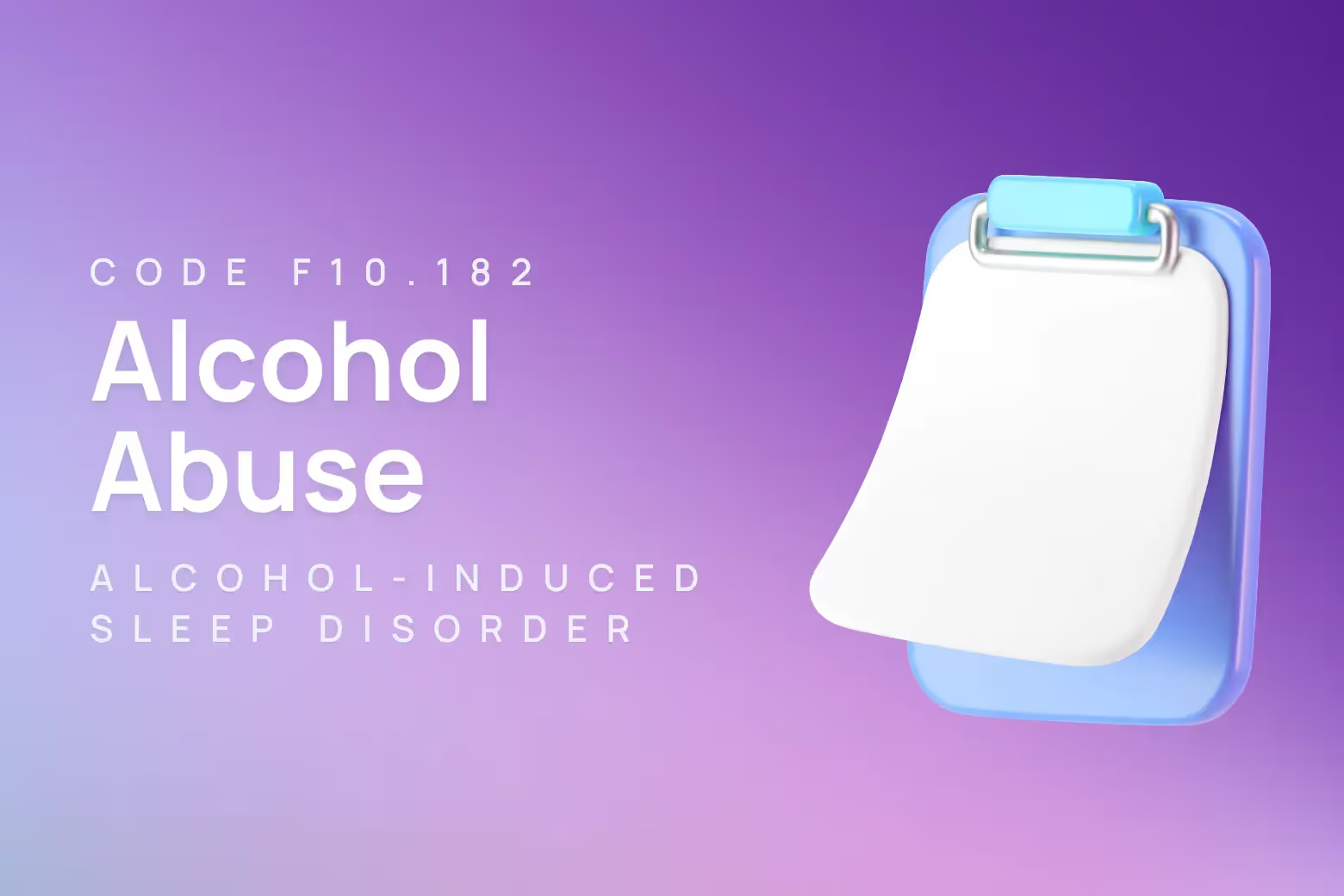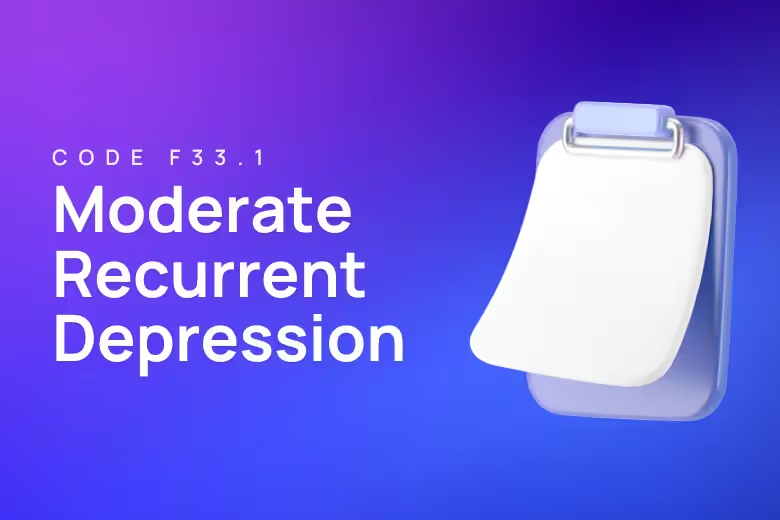ICD-10 code for alcohol dependence with alcohol-induced persisting amnestic disorder

F10.26 is the ICD-10 code for alcohol dependence with alcohol-induced persisting amnestic disorder.
This code identifies clients who have developed severe memory impairment due to chronic alcohol use, typically associated with thiamine deficiency and neurological damage.
Accurate diagnosis is critical for treatment planning and addressing the complex cognitive and behavioral symptoms that characterize this condition.
Key features:
- Combines alcohol dependence criteria with persistent memory deficits
- Memory impairment must persist beyond acute intoxication or withdrawal
- Often associated with Wernicke-Korsakoff syndrome spectrum
- Requires comprehensive cognitive assessment for accurate coding

Diagnostic criteria for alcohol dependence with alcohol-induced persisting amnestic disorder (F10.26)
The F10.26 diagnosis requires meeting criteria for alcohol dependence alongside persistent cognitive dysfunction.
Clients must demonstrate significant memory problems that continue well beyond periods of active alcohol use or withdrawal symptoms.
Alcohol dependence criteria include:
- consuming alcohol in larger amounts than intended
- persistent unsuccessful attempts to control drinking
- spending significant time obtaining or recovering from alcohol use.
Tolerance and withdrawal symptoms typically develop alongside continued use despite knowledge of persistent problems caused by alcohol.
Key diagnostic requirements include:
- Presence of at least two alcohol use disorder symptoms within a 12-month period
- Memory impairment that includes deficits in learning new information
- Inability to recall previously learned information
- Cognitive symptoms that persist beyond acute intoxication or withdrawal
- Memory problems that cause clinically significant impairment in functioning
- Symptoms not attributable to other medical conditions or substance use
The amnestic component ranges from mild reversible impairment to severe irreversible conditions like Wernicke-Korsakoff syndrome.
Memory difficulties often manifest as problems with short-term memory formation and retrieval of recent events, while long-term memories may remain relatively intact initially.
When to use F10.26 diagnosis code
Differential diagnosis becomes essential when distinguishing alcohol-induced memory problems from other cognitive disorders. Clinicians must carefully evaluate the temporal relationship between alcohol use and cognitive symptoms.
F10.26 vs F06.0 (Amnestic disorder due to known physiological condition)
F10.26 specifically applies when memory impairment directly results from chronic alcohol use and associated thiamine deficiency.
The cognitive problems must have a clear temporal relationship to prolonged heavy drinking patterns.
F06.0 covers memory disorders caused by other medical conditions like head trauma, stroke, or neurodegenerative diseases.
These conditions typically show different onset patterns and progression unrelated to alcohol consumption.
F10.26 vs F03.90 (Unspecified dementia)
Memory problems in F10.26 primarily affect new learning and recent memory formation, often with preserved personality and social functioning initially.
The condition may show some improvement with sustained abstinence and proper nutrition.
Dementia involves broader cognitive decline affecting multiple domains including judgment, abstract thinking, and personality changes.
Progressive deterioration continues regardless of alcohol cessation in true dementia cases.
Related ICD-10 codes
Related alcohol-induced disorders include:
- F10.20 - Alcohol dependence, uncomplicated
- F10.21 - Alcohol dependence, in remission
- F10.27 - Alcohol dependence with alcohol-induced persisting dementia
- F10.96 - Alcohol use, unspecified with alcohol-induced persisting amnestic disorder
- F04 - Amnestic disorder due to known physiological condition
Interventions and CPT codes for alcohol dependence with alcohol-induced persisting amnestic disorder
Treatment approaches must address both the underlying alcohol dependence and the cognitive impairment. Recovery requires sustained abstinence combined with cognitive rehabilitation strategies.
Comprehensive diagnostic evaluation
Initial assessment establishes baseline cognitive functioning and treatment needs. This includes detailed substance use history, mental status examination, and cognitive screening tools like the Montreal Cognitive Assessment (MOCA).
- 90791 - Psychiatric diagnostic evaluation for initial intake and diagnosis establishment
Individual psychotherapy interventions
Cognitive behavioral therapy helps clients develop coping strategies while accommodating memory limitations. Treatment focuses on relapse prevention and adapting to cognitive changes.
- 90832 - Psychotherapy, 30 minutes (for clients with significant cognitive limitations)
- 90834 - Psychotherapy, 45 minutes (standard individual therapy sessions)
- 90837 - Psychotherapy, 60 minutes (intensive sessions for complex cases)
Family therapy approaches
Family involvement becomes crucial for clients with memory impairment. Treatment addresses family dynamics, caregiver burden, and developing supportive home environments.
- 90846 - Family psychotherapy without patient present
- 90847 - Family psychotherapy with patient present
Screening and brief intervention services
Regular monitoring helps track cognitive recovery and prevent relapse. Structured assessments guide treatment modifications.
- 99408 - Alcohol screening and brief intervention, 15-30 minutes
- G0396 - Medicare structured assessment and brief intervention, 15-30 minutes
- 96127 - Brief emotional/behavioral assessment per instrument (for cognitive screening tools)
(CPT codes alcohol abuse.txt, guidelines-for-the-treatment-of-alcohol-problems.pdf)
How Upheal improves F10.26 ICD-10 documentation
Suggesting appropriate ICD-10 codes based on session content
Upheal's clinical documentation platform recognizes patterns in session notes that suggest alcohol-induced cognitive impairment.
The platform identifies key phrases related to memory problems, alcohol dependence symptoms, and cognitive assessment results to recommend F10.26 coding when appropriate.
The system helps distinguish between temporary alcohol-related cognitive effects and persistent amnestic disorders. This ensures accurate code selection based on symptom duration, severity, and functional impairment documented during sessions.
Maintaining HIPAA-compliant records with proper diagnostic coding
Documentation for F10.26 requires detailed tracking of both substance use patterns and cognitive functioning over time.
Upheal maintains secure, comprehensive records that support the diagnosis with evidence of persistent memory impairment beyond acute intoxication periods.
The platform ensures that cognitive assessment results, family reports, and functional impairment observations are properly documented to support code usage.
This creates a clear clinical picture supporting the dual diagnosis of alcohol dependence and persistent amnestic disorder.
Reducing administrative burden so you can focus on client care
Managing clients with F10.26 requires intensive documentation of cognitive status, safety concerns, and treatment modifications.
Upheal automates much of this documentation process, allowing clinicians to spend more time on direct cognitive assessment and family education.
The platform tracks medication compliance, abstinence periods, and cognitive improvement patterns without manual data entry.
This supports treatment planning while ensuring billing accuracy for this complex diagnostic category.
Supporting clients with alcohol dependence and persistent memory impairment
Clients diagnosed with F10.26 face unique challenges requiring specialized treatment approaches.
The combination of addiction and cognitive impairment demands careful balance between traditional substance abuse treatment and cognitive rehabilitation strategies.
Treatment success depends heavily on family involvement and environmental modifications.
Clients often need structured living situations, medication management assistance, and simplified treatment approaches that accommodate memory limitations while maintaining therapeutic effectiveness.
Recovery potential varies significantly based on the extent of neurological damage and time to treatment initiation.
Early intervention with thiamine replacement and sustained abstinence can lead to meaningful cognitive improvement, though some deficits may persist long-term.
Modern clinical documentation tools help behavioral health providers track the complex interplay between cognitive symptoms and addiction recovery.
Upheal's clinical documentation platform supports clinicians in managing these challenging cases by maintaining detailed records of cognitive status, treatment responses, and family involvement while ensuring accurate billing for F10.26 services.
Try Upheal free to experience how AI-powered documentation can improve your clinical workflow with complex dual-diagnosis clients.













